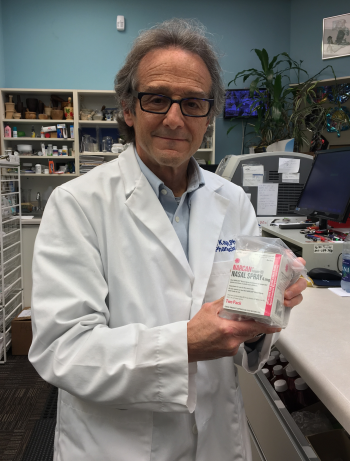Necrotizing pneumonia, curcumin to the rescue, Campbell’s soup, and more
06 Mar 2020
Posted by Andrew Kantor
SB313 passes Georgia SenateAnother one of our priority bills has passed — this time it was SB 313, which would “provide extensive revisions regarding pharmacy benefits managers,” aka reining them in. The PBMs pushed back hard, but thanks in part to everyone who called, e-mailed, faxed, and otherwise reached out to their senators — we’ve had another step on the road to victory! |
Grandma may need to up her game
Campbell’s Soup said it’s increasing its soup production in anticipation of the coronavirus’s spread.
“[W]e’re using a little bit the analogy of weather or natural disasters. Where do we see demand coming in a greater rate? And we’ve upped that level of production to be able to maximize our inventory to be prepared for whatever unfolds here.”
Region meetings are a-comin’!
Yep, it’s that time of year — time for GPhA’s 12 spring Region Presidents’ Briefings.
What are region meetings? They’re where pharmacy pros and students from each of the states 12 regions meet for an evening of good food at a local eatery*, networking, making friends, and an hour of CPE — all for a mere $10 thanks to our sponsors.
Check out the details and sign up for yours at GPhA.org/regions today!
* That’s hipster for “restaurant”
Hard-to-believe treatments
The spice is life, and the spice is … curcumin? Apparently if you deliver it via nanoparticles, it can treat both Alzheimer’s and genital herpes.
Cold sores vs brain tumors: An engineered herpes virus (combined with gamma secretase inhibitors) can apparently deliver a “one-two punch” that can eliminate brain tumors in mice.
Shout-out to Ira Katz!
The Little Five Points pharmacist became the first of the Georgia Pharmacy Foundation’s Champions for Opioid Safety. He received the designation by completing a series of educational programming aimed at reducing opioid-related overdoses, then demonstrating that he’s applied that knowledge to his pharmacy.
“The bottom line is that many people within greater Atlanta know that they can count on Little 5 Points Pharmacy for education about opioid safety as well as how to administer Narcan which we provide at no charge,” Katz said. He estimates he has dispensed more than 1,000 units of naloxone to the local community to help with the crisis.

Acid test for opioids
German scientists have made an interesting discovery about how and whether opioids work: The acidity of the area in pain makes a difference. By fine tuning the particular opioid molecule, they can strike a better balance between pain relief and the possibility of addiction.
“The more closely the pKa value of the binding molecule matches the acidity level of the inflamed or injured tissue, the more selective is the activation of the opioid receptors at the source of pain and the lower the risk of addiction or side effects.”
NCPA wants to help you expand
Have you thought about partnering with a physician to offer your expertise and expand your practice? You should!
Our friends at NCPA have a great program coming up. It’s called Enhanced Services Boot Camp and it’s one intensive day: April 16 in Concord, N.C.
Learn about reimbursement, smart documentation, strategies for expanding your services, tutorials incorporating care planning, “and much, much more!” Click here to learn and sign up!
You’ll always sound precocious
Ethylenediaminetetraacetic acid. It’s not just a line from the hit song in “Mary Poppins 3: Dark Territory.” When combined with acidified nitrite (into a compound called AB569), it might be a new kind of antibiotic — one that can kill superbugs without harming human cells.
The top three priority pathogens include highly drug-resistant Acinetobacter baumannii, Pseudomonas aeruginosa, and Enterobacteriaceae. The AB569 compound has been shown to kill these bacteria, plus a wide variety of others, including the notoriously difficult to treat Methicillin-resistant Staphylococcus aureus or MRSA.
All in the name
Want someone to stop vaping? Don’t say, “You can get sick.” Be specific: “You can get necrotizing pneumonia.”
You’ll find a way to make your natural tendencies pay
Gum inflammation is linked to diabetes. So why not have dentists — when they’re not busy sharpening those pointy things they use — screen patients for type 2 diabetes? British researchers did just that.
And what d’ya know: They “found that using risk assessment tools, questionnaires with patients, and blood testing at the dental surgery could improve health outcomes for people at risk of type 2 diabetes.”
I don’t get to use these headlines
For your front-of counter: “Bioré encourages self-love“.


